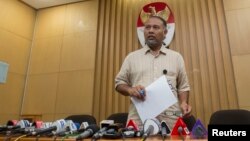Indonesia’s Corruption Eradication Commission (KPK) has been battered in recent months by a combination of judicial decisions and investigations into its the leaders. Take for example this editorial published on April 1 in the Jakarta Globe newspaper, which could not have been more blunt.
“The [Indonesian state] anti-graft body has been paralyzed, while the nation’s spirit and energy to fight corruption is getting weaker every day.”
Formed in 2002 and launched a year later, the KPK has built a formidable reputation for pursuing high profile cases and securing convictions. But in doing so, the panel has also accumulated a number of opponents in Jakarta. Among them: members of the national police and Indonesia’s judiciary.
More recently, the KPK’s leadership itself has been accused of corruption.
Agency chairman Abraham Samad, in power since 2011, and deputy chairman Bambang Widjojanto were both suspended after being targeted in police investigations. Samad was named as a suspect in an alleged document forgery case. Widjojanto was arrested in January, accused of having witnesses provide false testimony in a 2010 election case.
Retaliation
It’s no coincidence that the actions taken against the KPK’s top two officials came after the commision accused the man nominated to head Indonesia’s National Police, General Budi Gunawan, of graft. In response to that, South Jakarta District Court Judge Sarpin Rizaldi issued a ruling that nullified the general’s status as a "suspect" with the KPK.
Then, the judge continued his attack against the anti-corruption agency, stating that the KPK’s naming of Budi Gunawan as a suspect was not legal because Budi accepted gifts that did not come at the expense of the state. Furthermore, the judge determined that the KPK only had the authority to investigate the highest and most powerful officials, which, according to the judge, did not include the general.
Following Judge Sarpin’s ruling, a number of KPK corruption suspects are filing pretrial suits against the commission, hoping to eviscerate the cases against them, according to a report published in the Jakarta Globe. One of the first was Indonesia’s former Minister of Religious Affairs Suryadharma, whose pretrial motion was heard on March 31. The former official is challenging allegations that he mismanaged Indonesia’s state funds for the Hajj, the annual Muslim pilgrimage.
“If he [Suryadharma] can convince the judge to overturn his suspect status and have the KPK’s investigation stopped, then we can almost hear the death bell of the anti-graft war. It will be the end of the KPK and victory for the corrupters," wrote the Jakarta Globe in its April 1 editorial.
Broad powers
The KPK was created following the era of President Suharto, who ran Indonesia as a kleptocracy from 1967 until his resignation in 1998. While laws enabling police and prosecutors to pursue corruption cases were passed in 1999, the KPK was designed to be a robust investigatory panel.
The agency not only probes and prosecutes corruption cases, but also has the power to conduct warrantless wiretaps, freeze financial transactions, impose travel bans, and detain suspects, which it has frequently done.
These powers have long created friction with the police.
In April 2009, Indonesian National Police Chief Detective Susno Duadji reacted angrily when he discovered his phone was tapped for KPK investigation. Just a few months later, the police pressure against the agency escalated, culminating in the arrest of two KPK deputy chairmen, Chandra Hamzah and Bibit Samad Rianto on allegations of extortion and bribery. Both publicly declared their prosecutions political witch hunts, triggering public rallies in their support.
In response, Indonesian President Susilo Bambang Yuhhoyono appointed a commission to look into the charges. Then, tapes of wiretaps surfaced that indicated a conspiracy to take down the KPK, which resulted in the release of both Chandra and Bibit.
Three years later in 2012, another crisis erupted when the KPK detained Inspector General Djoko Susilo on corruption charges. The KPK’s prosecution prevailed, with the official sentenced to 18 years in prison and fined the equivalent of $2.62 million a year later. That is seen by observers as the stage setting for the “payback” actions earlier this year against KPK Chairman Abraham Samad and Deputy Bambang Widjojanto.
A long haul
One of the KPK’s major agendas for 2015 is reaching memorandums of understanding with relevant Indonesian ministries and authorities regarding anti-corruption oversight and protections for the nation’s natural resources. The commission wants every bit of the industry -- from oil to fisheries -- under its review.
“We should work together on eradicating corruption in the [natural resources] sector – it could lead to eradicating corruption for good," said President Joko Widodo.
But Indonesia has a long way to go, according to Transparency International, which ranks the country at 107 out of its 175 corruption index. But earlier this year, the group has weighed in on the side of graft commission, saying “We are concerned with the current political and legal systems which lead to the KPK’s weakening.”
It also cited “efforts to fabricate evidence and cases against KPK’s commissioners and investigators,” along with media campaigns to tarnish its credibility. It has demanded an end to what it called "acts to criminalize KPK’s commissioners and staff."
“It is obvious that the arrest of Mr. Wijayanto and the attacks on other members of the KPK is a reprisal for its defense of integrity in the appointment process of the chief of police," said José Ugaz, Transparency International's chairman.
"People are already on the streets supporting the KPK because they know it is a bastion against corruption in a country where corruption hurts ordinary people.”









